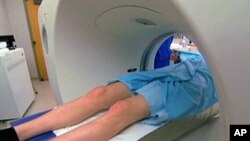Scientists at the U.S. Food and Drug Administration disagree about the risks from CT scans given during virtual colonoscopies. Doctors who favor the procedure say it is less invasive and more cost effective than a conventional colonoscopy. Those against it say the CT scans expose patients to too much radiation.
Colon cancer is one of the world's deadliest diseases, but it often has no symptoms in the early stages. That's why doctors urge adults over 50 to have a colonoscopy to detect any possible cancer.
Conventional colonoscopy is performed with a long, flexible tube called a colonoscope that is equipped with a tiny fiber-optic video camera and light at the end. The colonoscope is inserted into a patient's colon. Doctors can see the images from the colonoscope on a video monitor. They can also remove any abnormal growths or polyps during the procedure.
A less invasive procedure known as a virtual colonscopy is done with a CT scan that passes x-rays through a patient's abdomen.
Dr. Mahadevappa Mahesh, a professor of Radiology and Medicine at Johns Hopkins University School of Medicine, says virtual colonoscopies can save the lives of many patients. "(A) lot of the time patients (are) not coming to the clinic after they talk to their doctors (about conventional colonoscopy). They see the invasiveness involved. They get scared. They might not get anything done. They might end up getting cancer," he said. Virtual colonoscopy as a screening tool is quite effective thats one of the reason why national cancer Institute recommends this as one of the screening device."
If growths or polyps are found during a virtual colonscopy, then a conventional colonoscopy must be done to remove them.
But some doctors say the CT scan exposes patients unnecessarily to harmful radiation, as much radiation as a patient might receive from 400 chest x-rays.
Dr. Julian Nicholas is a scientist, formerly with the Food and Drug Administration (FDA). He says arguments for virtual colonoscopy are not sound. "There was an absence of sufficient valid scientific evidence that the use of CT devices for colorectal cancer is both safe and effective," he said.
Dr. Nicholas says before he left the FDA, he and other scientists warned against the routine use of CT scans. "FDA physicians and scientists were ridiculed and chastized for raising the bugaboo (fearful image) of radiation."
Dr. Jeffrey Shuren from the FDA agrees that patients may not be fully aware of the risks involved in a virtual colonoscopy.
"What we assure is that the technologies that do come on the market are safe and effective, but whether or not they should be used on a given case, a given patient, is a decision that is made by the individual practitioner," he said.
But with 70 million CT scans being performed in the U.S. every year, the government is under pressure to make an official recommendation on how much radiation is safe during a CT scan.
This report is narrated by Carol Pearson.









